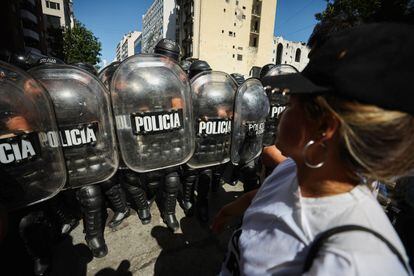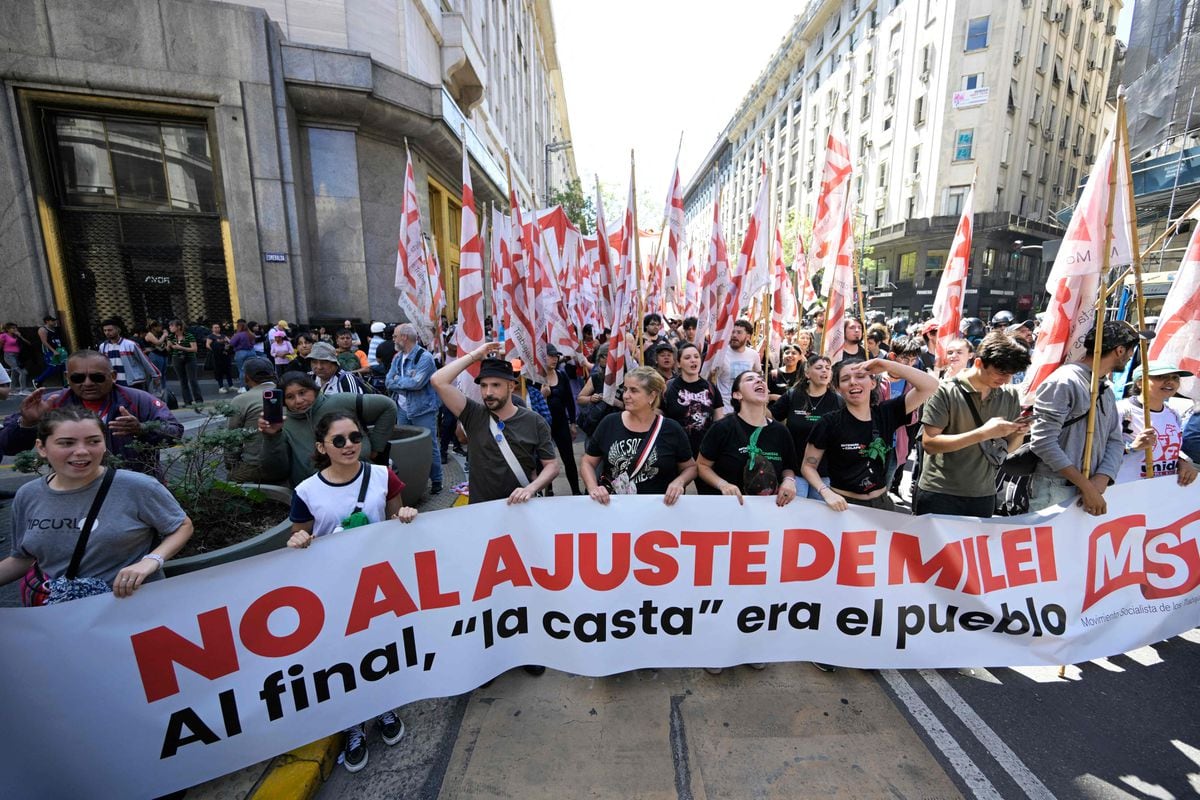This Wednesday, in a extremely tense environment, tens of 1000’s of Argentines took to the streets to protest in opposition to Javier Milei’s authorities and its harsh cuts to public spending for the primary time. Buenos Aires dawned with an enormous police deployment on the entrances to town and prepare stations, and reinforcements had been added because the demonstration’s scheduled 4 p.m. begin time approached. The environment of the Plaza de Mayo had been closely guarded by riot police; that they had the clear objective of stopping avenue blockages and guaranteeing the free circulation of visitors.
Safety forces failed to fulfill this radical goal. The excessive turnout made it inconceivable for demonstrators to march solely on the sidewalk, as the federal government needed. Protestors superior with banners and drums alongside all the width of the 2 avenues resulting in the Plaza de Mayo, the epicenter of the protest, and visitors needed to be diverted to close by streets.
The group chanted “employee unity,” whereas some protesters approached the police cordon to insult the riot police. They had been ready for arrests and whistled as vans handed by.
The demonstration came about in a tense environment, however it remained peaceable. There have been solely two arrests in an remoted confrontation, amid the massive, peaceable march referred to as by over 100 Argentine organizations. Initially, the thought was to recollect the victims of the violent repression that marked the tip of Fernando de la Rúa’s authorities in 2001, as Argentines commemorate each December 20. A complete of 39 individuals had been killed and near 500 injured throughout mass protests. However this 12 months’s demonstration took on a brand new which means after Milei introduced pending cuts. It was the primary protest in opposition to his administration, coming solely ten days after he assumed workplace because the president of Argentina.
“Milei, you swindler. You promised austerity for the political caste, and also you enacted austerity for the individuals,” one banner learn. One other signal mentioned: “Cash for schooling, not for the IMF.” That one belonged to Catalina, a instructor from La Matanza, the biggest metropolis within the suburbs of Buenos Aires. She defined that “the state of affairs in public faculties is determined. There are kids who go hungry, typically they arrive to the classroom with out having eaten, and with Milei it can worsen as a result of meals costs soared after the devaluation.” Alberto Fernández left the workplace with an annual inflation charge of 160%, however official estimates for 2024 are four-digit figures, a world file.
The ban on picketing displays a whole about-face within the state’s response to considered one of Argentina’s commonest types of protest. Pickets include blocking the streets and highways for hours, typically even days. In current a long time, there was plenty of tolerance for these protests; some pickets even concerned Milei himself and his Safety Minister, Patricia Bullrich.
The demonstrators occupied some streets as we speak, however they didn’t block the principle visitors arteries, a center floor that happy each side. Each the organizations and the federal government thought of the day successful.
The far-right authorities’s angle doesn’t come as a shock. It campaigned on the promise to manage the streets and that’s its hottest coverage, even amongst those that didn’t vote for Milei. 65% of the inhabitants approves of the federal government guaranteeing freedom of motion, in keeping with a survey performed final week by the College of Buenos Aires Observatory of Utilized Social Psychology. However, over 50% oppose Milei’s different acknowledged insurance policies, together with dollarization; the privatization of the state-owned oil firm YPF; the deregulation of meals and gas costs; and the elimination of power and public transportation subsidies.

No youngsters on the protest
Previously few days, the federal government did every thing potential to dissuade protesters. It requested demonstrators to keep away from bringing youngsters to the protest, “in order to not expose them to the warmth and violence,” and it threatened to strip those that blocked the streets of their social advantages. Thus, Argentina’s poorest residents had been trapped between two extremes: social organizations, which inspired them to exhibit, and the federal government, which warned them not to take action and arrange an nameless hotline to report in the event that they had been pressured to attend the march. Official sources say that over 9,000 individuals referred to as to report threats from social organizations.
Lots of those that attended the protest within the plaza this Wednesday had been pushing again in opposition to a stereotype that they’re pressured to contest. “I needed to come back to the march as a result of I can’t afford to eat. They name us lazy, planeros [welfare queens], however I work greater than anybody else. I obtain support and work at a retailer that pays me a pittance whereas the proprietor holidays in Uruguay,” says Fatima Flores. She was holding a one-year-old child, one of many few youngsters current at an illustration that many feared would finish in severe clashes and police repression.
“This nation’s downside is just not protests; the nation’s downside is that Milei took away 50% of our buying energy in a single day with a devaluation,” mentioned Betina Sanchís, a 70-something retiree on the As soon as prepare station, which was tightly managed by law enforcement officials all through the day. She says that she suffers insomnia as a result of she doesn’t know if she can have a roof over her head subsequent 12 months. Presently, she pays 40,000 pesos ($50)—a 3rd of her pension— for a room, however Milei’s determination to chop pensions makes her concern that she must give her room up in a matter of months. Sanchís says Argentines are used to crises and getting out of them, however she laments the rising division she sees in society. “I don’t like every of this in any respect. It’s [pitting] the poor in opposition to the poor, as a substitute of uniting us. It’s going to finish very badly,” she warns.
Join for our weekly publication to get extra English-language information protection from EL PAÍS USA Version

